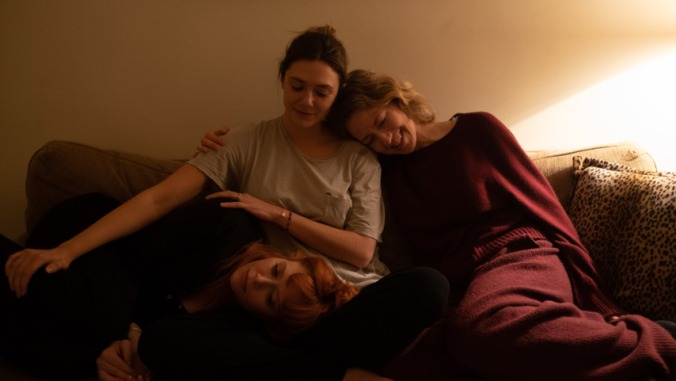His Three Daughters Confronts the Intimate, Sometimes Stuffy Tedium of Death

The pandemic was a propulsive moment for a few micro-genres in film, one of these being the intimate, single-location drama. Films born of smallness—not just in location, but also in cast size, narrative scale and so on (think of The Whale and One Night in Miami, for example)—were just the easiest to make. A common denominator among these movies, though, is that as a result of these elements they could feel like filmed stage plays; most were overwritten and stuffy, unsure of how to write characters in films with limited amounts of action. Though produced far after lockdown, His Three Daughters feels a bit like one of these COVID-dictated movies.
His Three Daughters centers on three sisters—Katie (Carrie Coon), Rachel (Natasha Lyonne) and Christina (Elizabeth Olsen)—who convene in their father Vincent’s (Jay O. Sanders) cramped apartment in New York City to take care of him in his final days. Most of the film takes place just between the three, with only a few other characters—a local cop, Rachel’s hook-up (Jovan Adepo) and some nurses—in the mix. It’s interested in the sisters’ grief, in each of their own peculiar resentments, in their ennui.
In this sense, the single-location drama feels like a natural fit—it becomes a spatial representation of the women’s stilling psycho-emotional concerns. Death, grief and resentment are dealt with slowly, with listlessness rather than verve, so that His Three Daughters’ sedentary nature need not be a detracting point of the film.
And yet, His Three Daughters struggles to find a tone that coheres, its characters and their soaring dramatic crescendos at times feeling discordant with its understated moments of quiet mundanity. Writer-director Azazel Jacobs is interested in etching three women that are acutely distinct from each other, but for a while they feel more like types than people. Katie is organized, learned, a planner, a woman who hasn’t smoked weed since her adolescence; Rachel is her foil, an aimless slacker who prefers waking and baking to anything else. Christina sits somewhere in the middle, misunderstood by both her sisters as a deadhead-turned-meditation practitioner who possesses a calmness that neither of her sisters do.
-

-

-

-

-

-

-

-

-

-

-

-

-

-

-

-

-

-

-

-

-

-

-

-

-

-

-

-

-

-

-

-

-

-

-

-

-

-

-

-








































